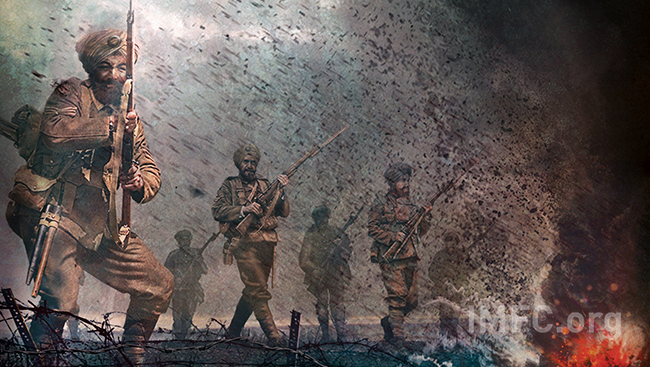Sikligars, hailing from outside of Punjab, were legendary weapon makers for Sikh armies but today are among the poorest in India. SAF International has made improving the lives of Sikligars a priority.
Every Vaisakhi many Sikhs will celebrate the birth of Khalsa with no knowledge of a community key in establishing the Khalsa: Sikligar Sikhs. Sikligars, hailing from outside of Punjab, were legendary weapon makers for Sikh armies but today are among the poorest in India. Sadly, for generations they have been abandoned by the mainstream Sikh community and their story forgotten from the Sikh conscious.
The exact origin of Sikligars is unknown. The most commonly held story is that Sikligars first met Sikhism during the time of Guru Hargobind Sahib. In response to Mughal repression, Guru Hargobind Sahib introduced the warrior tradition and the concept of self-defense in Sikhism. In the need for arms Guru Hargobind Sahib recruited ironsmiths or metal workers from Marwar (present day Rajasthan). These ‘low class’ labourers were now given respect and treated as equals. Subsequently Guru Gobind Sahib gave them the title Sikligars which means ‘polisher of weapons’ in Persian. Sikligars served as weapon makers for Sikh armies up to the reign of Maharajah Ranjit Singh. In fact, after the creation of the Khalsa not only did Sikligars make weapons but many fought in the Khalsa army.

However, the situation of Sikligars changed after the British annexed Punjab. The British concern for a revolt meant the skilled weapon makers were a threat. To avoid an uprising, the British Police forced Sikligars to disperse and leave Punjab. As a result, many Sikligar families became nomads moving from town to town to avoid harassment from the British police. This, coupled with the advancement of technology, made Sikligars irrelevant and they declined into poverty.
Today, Sikligar communities are spread throughout India and most live in unbearable conditions. Many live in remote villages on the edges of cities and towns. These communities have poor housing with no access to electricity, clean water or even a toilet. Sikligars are commonly illiterate and children are often working to support the family. For income, Sikligars mainly work menial and odd jobs, often simple metal work such as making keys and kitchen utensils. Many communities are constantly travelling to wherever they can find work or sell their low value items. Needless to say, many Sikligar parents cannot afford a proper meal for their children leaving them malnourished. Furthermore, being removed from mainstream society Sikligars have adopted very socially regressive practices. Most concerning is child marriage. In Sikligar communities, young girls are commonly married by age 14 or even earlier.
Interestingly, despite their isolation and neglect Sikligars have maintained their Sikh identity. They still claim to be followers of the Guru; many keep their hair unshorn; men still wear turbans; and many women wear salwar (loose trousers) and kameez (shirt) like women in Punjab. However, despite preserving their Sikh identity Sikligars are not recorded as Sikhs. Instead the Indian government categorizes them as scheduled caste which is a title for the lowest social class.
In recent years, media outlets have raised awareness about the situation of Sikligar Sikhs and NGOs are stepping up to help. This includes a young Canadian-based NGO named Sikhi Awareness Foundation commonly known as SAF International. SAF International mostly supports poverty reduction in Punjab and have also made improving the lives of Sikligars a priority.
SAF International has taken an ambitious approach of organizing non-profits to implement community development projects. These projects entail providing comprehensive support to put Sikligars on a path of social mobility. The supports provided include repairing homes and constructing washrooms; providing skills and job training; connecting working-age adults with the local economy; financial support for children’s education; and female specific support.
Their most vital service to ensure social mobility is the financial support for child education. Here SAF International enrolls all children into their Bloom Literacy Program which enrolls kids in a private school and covers their school and transportation fees. A profile of each child is posted on the SAF International website where someone can sponsor a child for $35 per month until they complete grade 12. Currently, the Bloom Literacy Program has over 600 children and more than half are girls.

Another notable service is the female specific support. This includes female hygiene products and health education workshops for young girls. SAF International is also using its goodwill and positive influence to stop the practice of child marriage. The SAF team also pays special focus to ensure families keep their daughters in school until they complete grade 12. SAF International is currently managing two community development projects for Sikligars in Gujarat and Madhya Pradesh. The Madhya Pradesh project is supporting a community of approximately 900 people in collaboration with the Sikh Council of Scotland.
The work of non-profits such as SAF International exemplifies the purpose of Guru Gobind Singh creating the Khalsa. Guru Gobind Singh ji devoted his life to fighting a revolution to achieve equality by breaking the status quo maintained by those in power – a revolution that cost him his life and family. The establishment of the Khalsa in 1699 was to create a community of the faithful that will continue to help the repressed and challenge social inequities. Unfortunately, today many Sikhs revere Guru Gobind Singh but reject his values and principles. So much of what he despised including class distinctions, apathy for the marginalized, and subjugation of women exists today in Sikh communities. What is most frustrating is that Guru Gobind’s biggest concern was for people being too celebratory of him that they forget his message.

Vaisakhi, the anniversary of the Khalsa, should be a cause for celebration. Sikhs have become established and prosperous throughout the world after centuries of persecution and subjugation. However, the meaning of Khalsa gets lost on some amidst the fancy outfits, food stalls, political speeches, business promotions, and packs of teenage boys trying hard to look tough. Vaisakhi should be a reminder that Sikhs have an obligation to genuinely work for equality and the marginalized. A good start is to reunify the Khalsa family by reaching out to Sikligars who have been neglected and struggling for generations.
You can help Sikligar families by sponsoring a child or becoming a monthly donor with SAF International – a Vancouver-based charity. To learn more about SAF International visit
www.safinternational.org
ABOUT THE AUTHOR: Balraj S. Kahlon is the President of SAF International and a graduate of the SFU School of Public Policy.












